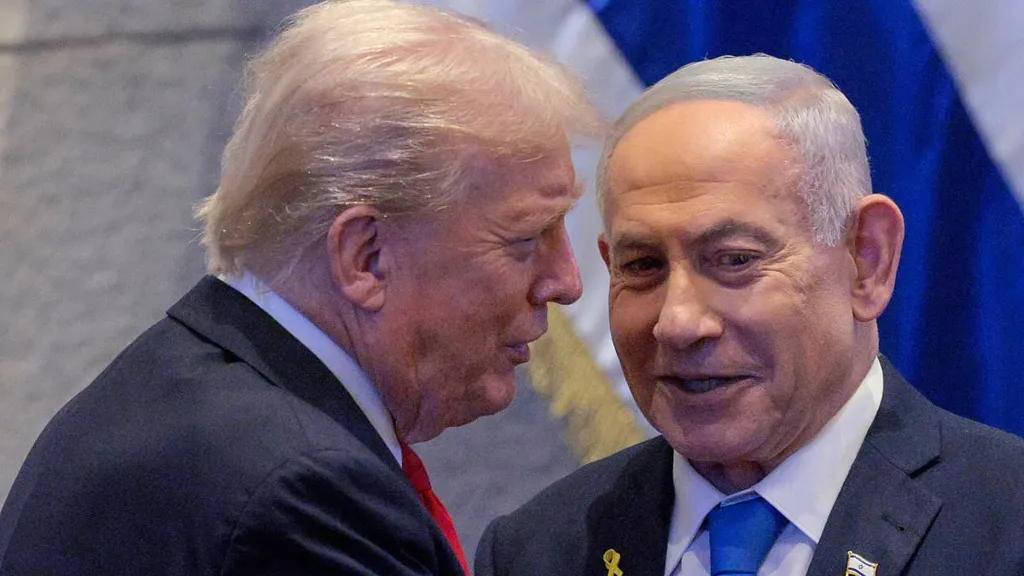Donald Trump brought about what he described as Israel's 'beautiful day' as he secured the release of all the remaining living hostages as part of a historic peace deal on Monday.
The US president was greeted by a standing ovation when he made a speech in Israel's parliament and is due to be awarded the country's highest civilian honour later this year.
Trump has also been described by Israeli prime minister Benjamin Netanyahu as the 'greatest friend' his country has ever had in the White House.
Moreover, by securing the release of the 20 hostages today, Trump has achieved what no other world leader, including his predecessor Joe Biden, had managed to date.
And while this is just the first step towards a more durable peace - with the details of Gaza's governance and the Israeli withdrawal still to be negotiated - the deal will likely be the signature achievement of his second term.
However, Trump's success in the Middle East has not come completely out of the blue.
Since stepping foot in the White House, Trump has pushed to end the Gaza war and it has long been one of the top items on his administration's agenda.
Nevertheless, just one month ago, when Israel launched unprecedented strikes on the Hamas negotiating team in Qatar, peace seemed very far away.
Donald Trump today brought about Israel's beautiful day as he secured the release of all the remaining living hostages as part of a historic peace deal
President Donald Trump signed a welcome book before speaking to Israel's Knesset today
Hostages Square was full of thousands jubilant citizens as the two year war in Gaza nears its end
The attack on September 9 violated the sovereignty of an American ally and risked expanding the conflict into a region-wide war.
Instead, however, Trump managed to turn this around into a key moment that helped lead to the signing of his ceasefire deal between Israel and Hamas last week.
Trump's unique style - which reportedly included shouting matches over the phone with Benjamin Netanyahu - appears to have contributed to the breakthrough.
Aaron David Miller of the Carnegie Endowment for International Peace previously explained that the president exhibited an unprecedented degree of pressure on the Israeli leader.
He told the BBC: 'There is no example of an American president literally telling an Israeli prime minister that you're going to have to comply or else.'
It was previously reported that Trump's negotiator Steve Witkoff was behind getting Netanyahu to agree to a temporary ceasefire late last year in exchange for the release of some hostages.
Meanwhile, when Israel launched air strikes on Syrian forces in July, it was Trump who encouraged Netanyahu to change course.
Nevertheless in public, Trump has consistently shown the 'all smiling' side to their relationship.
Netanyahu has also backed this narrative up, describing the US president as Israel's 'greatest ever ally in the White House'.
Trump showed his support for Israel during his first presidential term when he moved the US embassy from Tel Aviv to Jerusalem.
He also shocked the world in the summer when he launched US air strikes on nuclear enrichment facilities in Iran.
This followed similar attacks by Israel - who have long been concerned by Tehran's nuclear capability.
In contrast, the Biden administration had a far more tenuous relationship with Israel.
Divisions within the Democrat party over the Gaza war, gave Trump's predecessor far less room for manoeuvre.
Biden continued to give Israel support in public, but tried to moderate Netanyahu's actions in private.
This afternoon, Trump landed in Israel and he gave a speech to the country's lawmakers.
Standing up in parliament, Trump called the hostages' release an 'incredible triumph for Israel and the world', paying credit to mediators from Arab and Muslim world for pressuring Hamas.
He also urged Palestinians to 'turn forever from the path of terror' following the failure of 'jihadism and antisemitism', and vowed that the United States would 'never forget' Hamas’s October 7 attack.
'From October 7 until this week, Israel has been a nation at war, enduring burdens that only a proud and faithful people could withstand,' Trump said.
'For so many families across this land, it has been years since you’ve known a single day of true peace,' he said.
'But now it lasts, not only for Israelis, but also for Palestinians and for many others. The long and painful nightmare is finally over.'
At one point Trump got up from his seat and shook hands with Netanyahu, before embracing him.
This then prompted chants of 'Trump! Trump! Trump!'.
His speech however was interrupted by screaming hecklers. Far-left Arab Knesset members Ayman Odeh and Ofer Cassif held up a sign that read, 'recognize Palestine.'
They were quickly removed from the room as Knesset speaker Amir Ohana apologized.
'That was very efficient,' Trump said after the protesters were escorted out.
His speech came shortly after newly-freed hostages hugged one another in joy following their release from 738 days in captivity in Gaza.
Matan Angrest, 22; twin brothers Gali and Ziv Berman, 28; Alon Ohel, 24; Eitan Mor, 25; Guy Gilboa-Dalal, 24; and Omri Miran, 48 were the first hostages to be handed over to the Red Cross this morning.
The group of seven was whisked away to a military base in Re'im, near Gaza, before they reunited with their families.
They were followed by a second group of 13 living hostages, who have also finally arrived in Israel after more than two years in captivity.
The second group to return home were: Matan Zangauker, 25; Nimrod Cohen, 21; Ariel Cunio, 28; David Cunio, 35; Evyatar David, 24; Yosef-Chaim Ohana, 25; Elkana Bohbot, 36; Avinatan Or, 32; Bar Kupershtein, 23; Segev Kalfon, 27; Rom Braslabski, 21; Eitan Horn, 38; and Maxim Herkin, 37.
The bodies of 28 deceased hostages will be handed over later, a Hamas official said, as a task force works to locate their missing remains.
